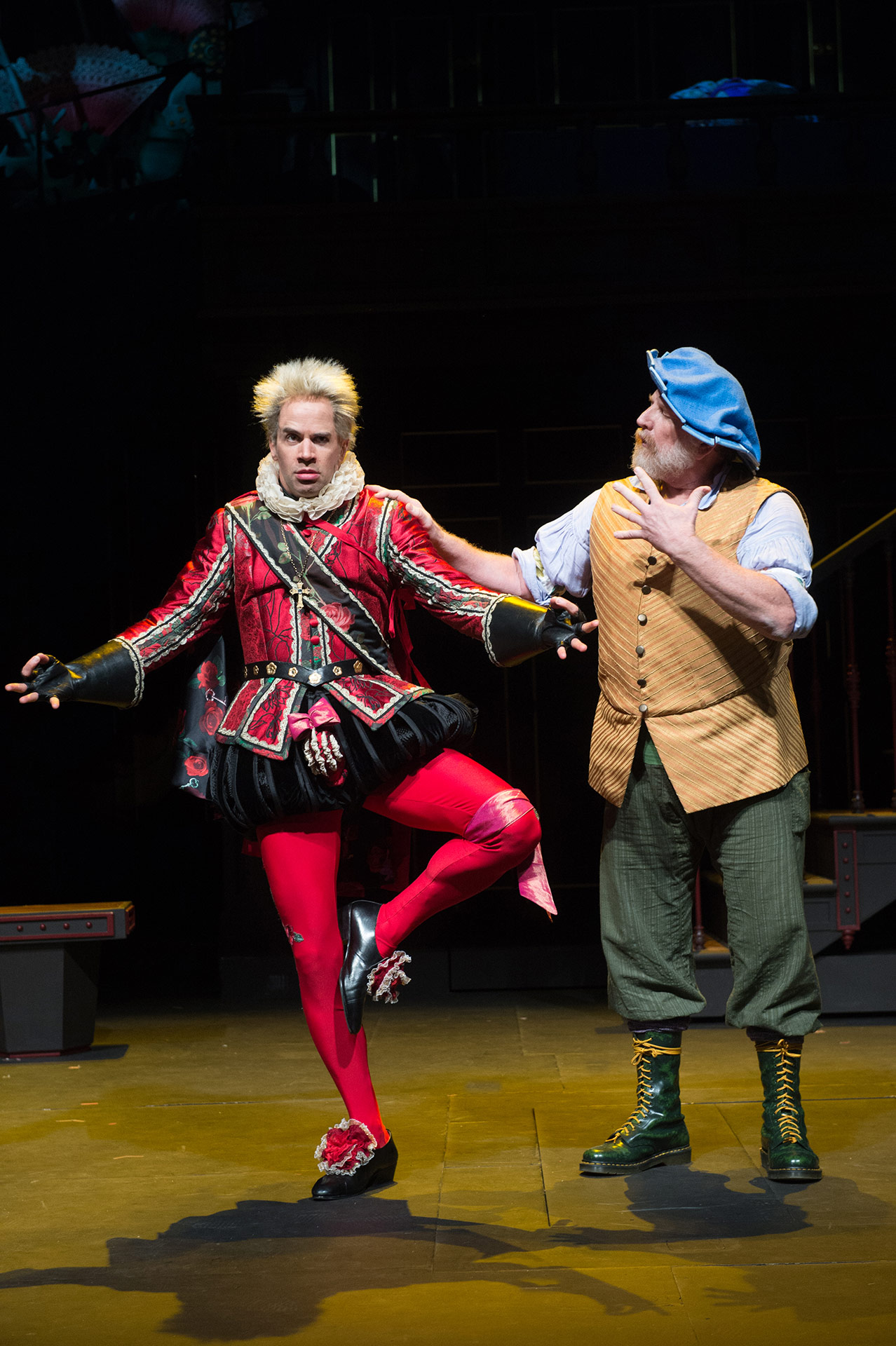 |
| Oregon Shakespeare Festival photo by Jenny Graham |
The Play
The lecherous knight, Sir John Falstaff (K.T. Vogt), is looking for a little action, with not one but two different married women, Mistress Page (Vilma Silva) and Mistress Ford (Amy Newman). Meanwhile, Page and her husband are looking to marry off their daughter Anne (Jamie Ann Romero) to two different suitors: Doctor Caius (Jeremy Peter Johnson, pictured above in red and black) and Slender (Cristofer Jean), but she wants to marry Fenton (William DeMerritt). Add a few servants, clergy, and a Justice, plus Falstaff's posse from the Henry plays (Bardolf, Nim, and Pistol), and you've got a huge crowd with plenty of confusion available.But much of the play is about the ridiculousness of Falstaff. There's really not much substance else, so you either enjoy the pratfalls and absurd situations or it becomes a bit tedious. Falstaff is ultimately outwitted by the Pages and Fords, and love wins out in the end, because this is a comedy, after all.
The Production
The the first and most obvious choice made here was casting a woman (Vogt) as Falstaff. In a play that is about seduction and such, it seems a somewhat odd choice, but equipped with a comical beard and an enormous codpiece that doubles as a purse, Vogt looks and acts the part. There are times when her shrieks and cackles seem a bit out of place, but really, in this play, nothing can really stand out as odd.The second major choice in the play is the music. Now and then a character or the whole cast will just break out in a 1980s pop tune. And many (but not all) of the costumes reflect that 80s pop look. At first it sort of seemed like they were going to literally turn the play into a musical, but instead it was just a few musical interludes where the lyrics were tangentially related to some plot element. And most of the songs are just short excerpts (probably to avoid licensing issues). It was fun, but I thought the digressions a bit pointless (I know, in a basically pointless play...), and with the show running about three hours long, it didn't seem really necessary. Much like the original musical OSF produced a couple of seasons back, Head Over Heels, the 80s soundtrack mostly seems to indicate that the generation that came of age to that music is now in the demographic that buys theater tickets and produces plays.
The director's notes in the playbill make it appear that she (Dawn Monique Williams) feels the music puts the emphasis on the young people, and that Anne Ford represents the romantic lead in the play. But frankly, Anne and Fenton have very few lines; their relationship is less substantive than that of the eponymous couple in Romeo and Juliet. So while they might be more appealing characters than Falstaff, there really isn't enough of their story to carry the play. For better or worse, this is Falstaff's play, but the character is not nearly as likable in this incarnation as he was in the Henry plays. It's just very hard to root for him at all, and that's needed to make a bad guy as the main character work.
Bottom Line
It's really a lot of mindless fluff. The 80s music is fun, with the dancing and all. It diverts from the endless inanity of the plot lines a bit. I suppose I would rather have seen the director try to make a more appealing version of Falstaff and some of the other characters. Vogt, Johnson, and Jean are all accomplished comic actors. I have seen them all carry scenes if not whole plays. But in this production, none of them has much going for them except laughs at their expense, and that seems a shame.As usual with OSF, it's well done, but I definitely felt like more could be made out of this play that just endless slapstick and plaguing Falstaff. It's visually quite appealing and the music is fun. I'd like to think there's more to be made of a Shakespearean comedy than that. It's not a waste of time, but it does feel like a squandered opportunity. Funny, but disappointing.
No comments:
Post a Comment